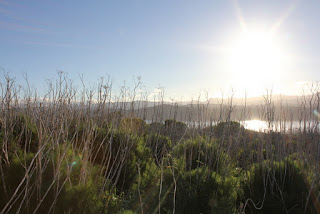I recently finished listening to Barbara Trapido’s novel Sex and Stravinsky on my iPod and quickly followed this up with Julian Barnes’ The Sense of an Ending, which won the Booker Prize this year.
The Sense of an Ending worked magnificently as an audiobook. There’s a single narrator, Tony Webster, who recalls specific moments in his life relating to a particular strand of memory: those relating to his friend, Adrian, who committed suicide in his early twenties. Tony weaves in and out of memory, digressing often on just what memory is and how it changes with time, but also finds the time to muse about the modern world, retirement, divorce and self-delusion. This is the kind of novel some agents might describe as quiet or slow, if you were to query them as a no-name writer, but I found it a thrilling and engaging story – thrilling, I guess, because it felt so intimate and real.
The most engaging part of the novel for me were the parts about Caroline’s mother, who ranks up there with Mrs Nickleby in the pantheon of aggravating mothers in fiction. Unfortunately, after Caroline’s mother dies (to the delight of the reader), Francis's voice for Caroline alters and becomes a bit too similar to her shrewish mother. This is no fault of Trapido, of course, but it is difficult to think about the text objectively without thinking about the slips and tangles in the audiobook version.
Having said this, I’m still a big advocate of audiobooks. In my experience there are far more successes (like Barnes’ and Dickens’ novels) that problem children.
Still a paperboy
For completists
Last month I blogged about the bad review I received (belatedly). I also wrote a column about it for the Dom Post but it wasn’t posted online (there’s no real logic I can see to what is and what isn’t posted on www.stuff.co.nz). I include a scan of it here for posterity's sake.
Common ground
You’ve got just over a week left to submit your short story for the Commonwealth Short Story Competition, for which I am one of the judges.
For those who’ve submitted or are still thinking about it, I wrote something about my experience with prizes for the Commonwealth Writers website: basically, don’t just enter competitions, revise your stories, submit to journals, get better, get published. Simple, eh?
I also wrote about my favourite bricks and mortar bookshop, Unity Books on Willis Street, for which I expect at least a high five next time I come a'browsing!
Offshore whore
I spoke to Julie Green of the Griffith REVIEW about my story, ‘Offshore service’, and my time spent in Queensland. You can read the interview here.
Side-effects of the NBA lockout
It looks like the chances of an NBA season this year are slim to none. This is terrible news for arena staff in the states and some lower level employees of the teams who rely on basketball games for a paycheck. Spare a thought also for the basketball journalists, who have had to stake out bargaining sessions between the players and the owners which have stretched into the wee small hours (and inevitablty end with both sides unwilling to make detailed comments at the ensuing press conference as negotiation is still ongoing).
Some writers are turning their attentions to other basketball leagues around the world (where a small number of NBA players are also looking to supplement their incomes). They appear heavily reliant on Google Translate to file their updates – today Yahoo Sports’ Adrian Wojnarowski tweeted that the Houston Rocket’s Marcin Gortat had signed with a Turkish team, then hastily tweeted a retraction that the two parties were in fact still negotiating and the confusion stemmed from Google Translate.
Much more exciting to me was the news from SB Nation blogger Tom Ziller (@teamziller) that when you throw a Chinese box score into Google Translate it tells you there is a statistical category “was invaded” ('turnovers' to you and me). Ziller also points to a headline which translates as "Yi Jianlian floating in the sky watching JR violence of his four years of a button changes."
I’m feeling a James Brown- (NZ poet not US soul singer) style poem coming on.
Novel update
I heard back from my editor last week after she read the first c.50,000 words of THE NOVEL. She referred to it as the embryo of my novel, which might be another way of putting it. Anyway, she liked it (it would be unfair to quote embryonic praise as there’s a lot that can go wrong between now and the final manuscript) and I am to push on and finish the beasty but it looks like it won’t come out till February 2013. This means I’ll only get to publish one book in my twenties. Oh well. It does give me a few extra months next year to really make it the best book I can. And to write some short stories and find them homes before the birth of THE NOVEL. And find a friggin' title.









